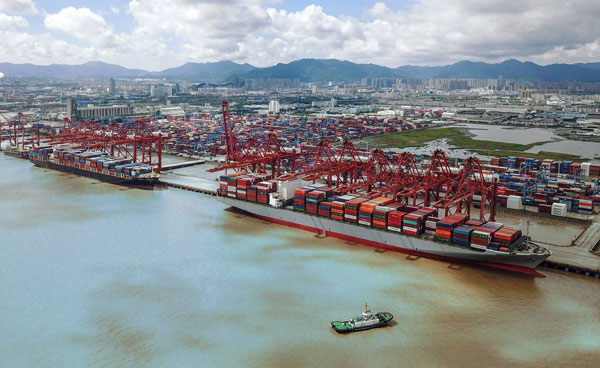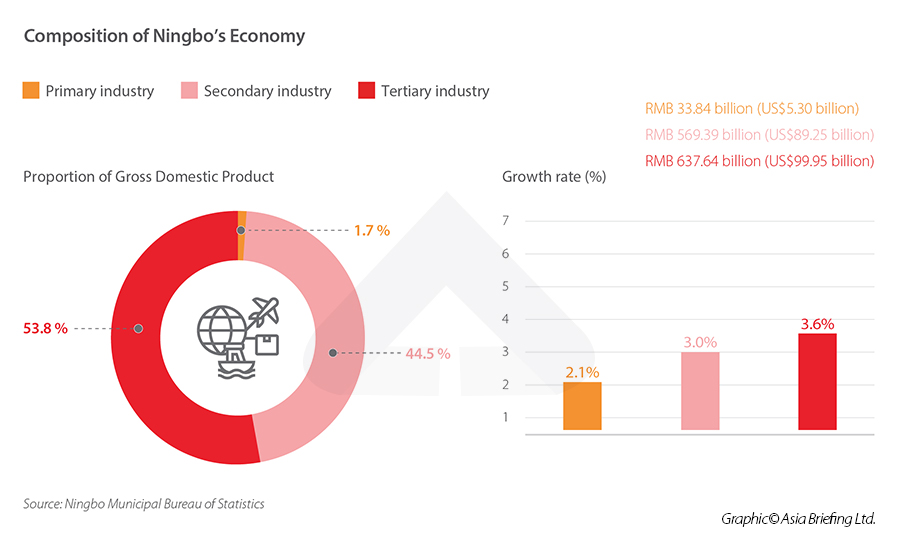In this city profile, we highlight the reasons that make investing in Ningbo a feasible alternative for international companies looking to establish an operation in China. Ningbo offers opportunities in areas that optimize integration of manufacturing technology and information technology as well as in the expanding advanced manufacturing and modern service industries.
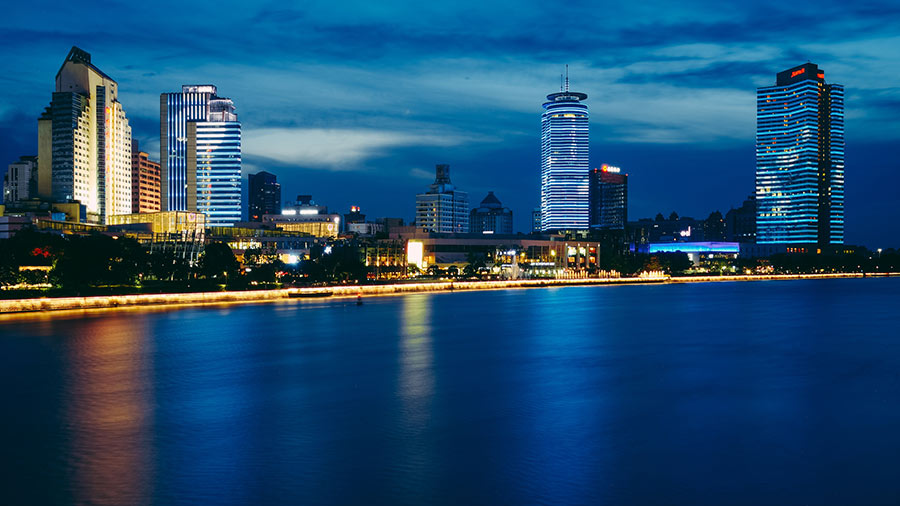
Ningbo is a major sub-provincial city in the northeast of Zhejiang Province. As the southern economic center of the Yangtze River Delta, Ningbo has always been a city of historical and economic importance in international trade. With the world’s largest cargo throughput and the world’s third largest container volume, the Port of Ningbo-Zhoushan is a multi-functional, comprehensive, and modern deep-water port integrating inland, estuarine, and seaport.
As a city with advanced manufacturing industrial clusters and port-adjacent industrial clusters, Ningbo has profitable enterprises in green petrochemical, automobile manufacturing, and high-end equipment production, among others. The green petrochemical industry facilitates agglomeration of upstream and downstream industries in the large-scale refining-chemical integration base.
Ningbo has nine national development zones, five national demonstration bases of emerging industrial sectors, and many leading enterprises and single champion enterprises showcasing innovation. In August 2019, China’s General Administration of Customs magazine published the 2018 ranking of China’s Top 100 foreign trade cities, with Ningbo ranking eighth.
Given the continuous promotion of Ningbo’s industrial upgrades, foreign-funded enterprises can also invest in opportunities arising out of the city’s transformation of its traditional industries, such as in smart manufacturing, among other fields. The Ningbo Bureau of Commerce has said that to improve the regional business environment, Ningbo would open its economy further and provide more sustained and robust support for foreign investment.
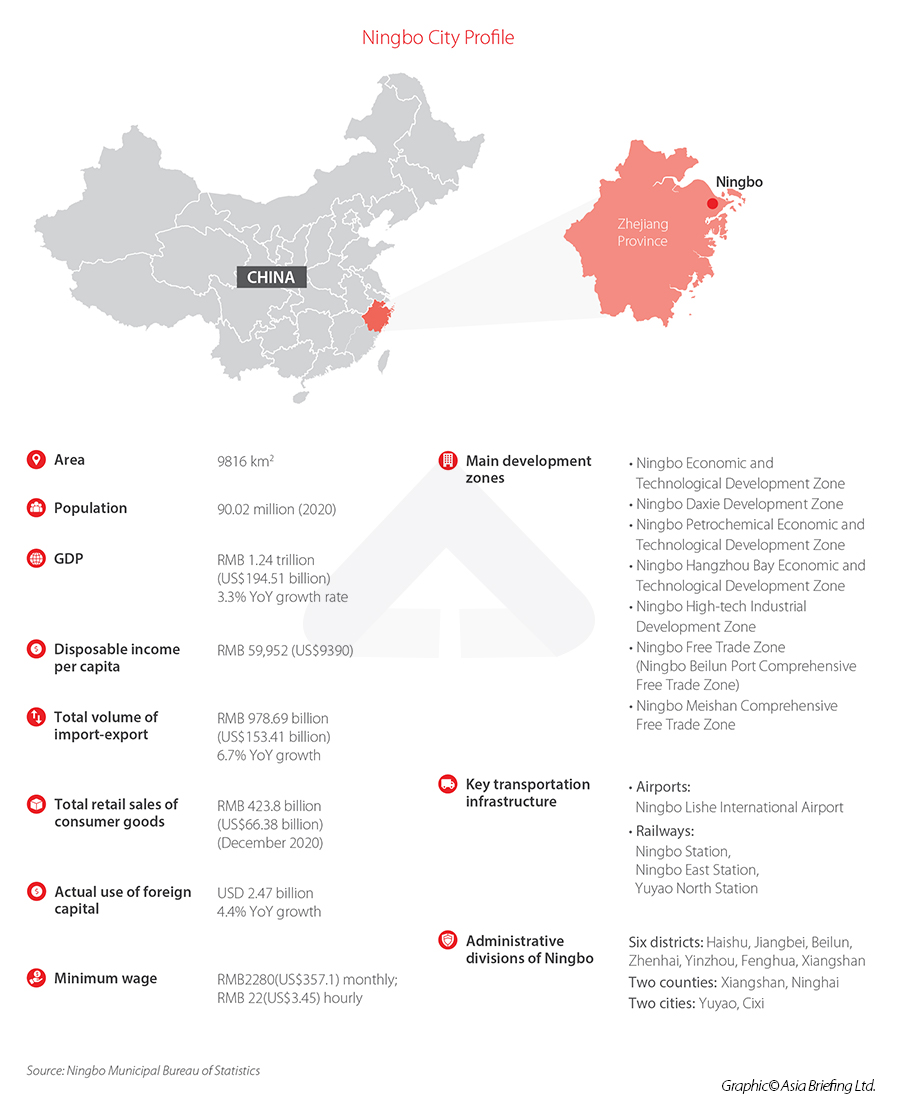
According to the Ningbo Bureau of Statistics and the National Bureau of Statistics of the People’s Republic of China’s preliminary calculation, Ningbo achieved a regional gross domestic product (GDP) of RMB 1,240.87 billion (approx.US$194.51 billion) in 2020, representing a 3.3 percent increase from 2019. The overall recovery is better than the national and provincial level; out of China’s 300 cities – Ningbo ranked 12th.

Based on the industrial structure in 2020, the added value of the primary industry was RMB 33.84 billion (approx.US$5.30 billion), up 2.1 percent. The secondary industry of the economy was RMB 569.39 billion (approx.US$89.25 billion), up 3.0 percent. The tertiary sector of the economy was RMB 637.64 billion (approx.US$99.95 billion), up 3.6 percent.
The contribution of the primary, secondary, and tertiary industries to GDP growth were 1.7 percent, 44.5 percent, and 53.8 percent, respectively.
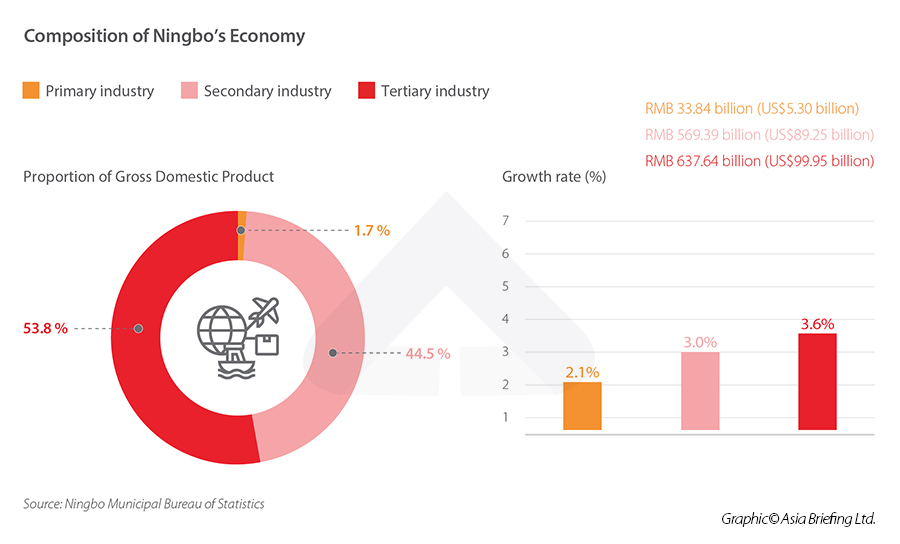
Foreign trade and investment landscape
In 2020, Ningbo’s foreign trade situation gradually recovered from the COVID-19 pandemic. The volume of trade in goods totaled RMB 978.69 billion (approx.US$153.41 billion), an increase of 6.7 percent. Exports amounted to RMB 640.70 billion (approx.US$100.43 billion), up 7.3 percent and imports RMB 337.99 billion (approx.US$52.98 billion), up 5.6 percent. Mechanical and electrical products accounted for 55.1 percent of the city’s total exports.
In terms of trade partners, there are 224 countries and regions that directly trade with Ningbo, among which the import and export volume to the US, EU and ASEAN reached RMB 173.53 billion (approx.US$27.17 billion), RMB 170.78 billion (approx.US$28.00 billion) and RMB 107.95 billion (approx.US$16.91 billion) in 2020, up 22.0 percent, 7.2 percent, and 10.5 percent, respectively. Ningbo’s imports and exports to 65 countries along the “Belt and Road” amounted to RMB 276.42 billion (approx.US$43.33 billion), up 4.9 percent, including RMB 29.52 billion (approx.US$4.63 billion) to 17 countries in Central and Eastern Europe, up 3.7 percent from 2019 to 2020.
Ningbo attracted 486 foreign-invested projects worth US$4.70 billion by the end of 2020. The city’s actual use of foreign investment stood at US$2.47 billion, up 4.4 percent. Of this total, 411 new projects were approved by the tertiary sector, representing an increase of 19.0 percent in the actual utilization of foreign capital of US$1.35 billion.
Ningbo has a strong advanced manufacturing industrial cluster. In 2020, the added value of the manufacturing industry in the city reached nearly RMB 569.39 billion (approx.US$89.25 billion), accounting for 44.5 percent of GDP.
There are more than 120,000 manufacturing enterprises, including in textile, garments, home electric appliances, plastic machines, auto parts, stationery, and mold. Since most enterprises engage in traditional manufacturing, their upgradation involves the industrial internet industry, for example, through automation. This will help local manufacturing entities improve efficiency, move operations up the industrial value chain, and expand the region’s overall production capacity.
Ningbo aims to speed up the deployment of industrial-level internet platforms for its enterprises manufacturing high-end equipment, auto parts, textiles and clothing, intelligent home appliances, etc.
Enterprises in the region are also actively researching and developing chips for industrial computing, strengthening intelligent equipment, such as complete sets of automation; nurturing and developing industries, such as intelligent sensors; and developing low-level hardware and basic cloud platforms.
Since the 13th five-year plan, Ningbo has prioritized the development of the services sector as an essential way to speed up economic transformation. Consequently, the services sector surpassed the local manufacturing sector for the first time in 2019, accounting for 49.1 percent of GDP. By 2020, the city’s service industries’ added value was projected to account for 53.8 percent of the city’s GDP. The services sector is now a driver of local economic growth and the main source of Ningbo’s tax revenue.
Ningbo’s tertiary / services sector structure has been optimized, and breakthroughs have been made in finance, commerce, science and technology, and information services industries; the proportion of producer services in the tertiary sector has risen to about 60 percent.
A key tertiary industry in Ningbo is trade service, whose growth has accelerated in recent years. The import and export volume of trade in goods in Ningbo accounted for 3.04 percent of China’s total trade in goods in 2020, ranking sixth among all Chinese cities. The import value of cross-border e-commerce online shopping has been ranked first in the country for three consecutive years. These demonstrated the efficiency and appeal of Ningbo’s trade services. Investors interested in Ningbo should pay attention to opportunities in this area.
Economic and Technological Development Zone
Founded in 1984, with a total area of 29.6 square kilometers, Economic and Technological Development Zones in Ningbo are among China’s earliest and largest national development zones.
Relying on the advantages of ports and their development linkages, the Economic and Technological Development Zones of Ningbo (Beilun District) has formed a port-adjacent industrial cluster with the automobile, equipment, petrochemical, steel, and energy as its focus. After more than 35 years of development, integrated circuits, high-end equipment, new materials, etc. are other emerging industries.
The Economic and Technological Development Zone host a large number of frontier enterprises, such as Geely, Shenzhou, and Haitian. There are 784 industrial enterprises located here, out of which 11 enterprises have an output value exceeding RMB 10 billion (approx.US$1.57 billion), 58 enterprises have an output value exceeding RMB 1 billion (approx.US$0.16 billion), and 18 companies are listed at home and abroad.
Established in 1993, Ningbo Daxie Development Zone benefits from the state-level economic and technological development zone policy. Through 27 years of development and construction, Daxie has come to focus on port development, green petrochemical, and new chemical materials industries.
As a modern port area, the Daxie Development Zone ranks among China’s top 10 comprehensive port areas. The world’s largest 450,000-ton crude oil terminal is here, accounting for 21 percent of the total number of berths in Ningbo. The zone is thus well poised to develop the green petrochemicals industry. It aims to become an international energy trade center and a leader of energy reform in China.
Established in 1992, Ningbo Bonded Zone is the earliest bonded area in Zhejiang province. Later in 2002, the State Council approved the establishment of Zhejiang Ningbo Export Processing Zone in Ningbo Bonded Zone, which is the second batch of export processing zones in China. On April 27, 2020, the State Council approved the transformation and upgrading of the original area of Ningbo Export Processing Zone to Ningbo Beilun Port Comprehensive Bonded Zone. In September 2020, Ningbo Beilun Port Comprehensive Bonded Zone was included in the scope of Zhejiang Free Trade Zone (Ningbo Area). At present, the zone accounts for nearly 10,000 enterprises of various types; in 2020, the region’s total production value was RMB 20.18 billion (approx.US$3.16 billion), an increase of 6.6 percent.
After more than 20 years of development, the area has focused on four functional industries – international trade, processing and manufacturing, bonded logistics, and digital. In the area of international trade, it has gathered more than 3,500 international trading enterprises. There are platforms for cross-border import e-commerce bases, imported goods markets, imported goods direct sales centers, and Central and Eastern European Specialty Products Perennial Exhibitions. In processing and manufacturing, focus is on the development of the electronic information industry and strategic emerging industries. In bonded logistics and digital, the zone has gathered more than 330 warehousing logistics enterprises. In recent years, the Ningbo Beilun port comprehensive bonded zone has accelerated digitalization of logistics, developed intelligent logistics, and promoted cloud warehouses’ construction.
To encourage overseas investors to invest locally, Ningbo City implements various incentive policies for foreign investment projects that meet certain industry requirements.
- Promote overseas investors’ direct investment with distributed profits: Qualified non-resident enterprises can defer withholding income tax payment as long as they reinvest equity investment incomes, such as dividends and bonuses derived from resident enterprises directly into projects and sectors not prohibited by the country.
- Ensuring land supply for major foreign-funded projects: Foreign-funded projects will be given priority in land application.
- Promote fair competition between domestic and foreign-funded enterprises: Foreign-invested enterprises can fully enjoy various industrial support policies and participate in government procurement bidding fairly.
- Innovative capital management of foreign-invested enterprises: Allow qualified foreign-invested enterprises to borrow funds in domestic and foreign currencies from abroad. Foreign investors can freely remit their investment income in RMB or foreign exchange in accordance with the law.
- Expand financing channels for foreign-invested companies: Encourage foreign-invested companies to go public, list on the New Third Board and Ningbo Equity Exchange Center, support the use of non-financial corporate debt financing instruments for financing.
- Optimize the foreign investment management system: Actively promote the “Internet + government services”, simplify the management procedures of foreign investment projects, and shorten the registration time for foreign investment enterprises.
- Optimize the environment for overseas talents: Overseas talents can enjoy a series of preferential policies in visa and work permits application and can get access to all other kinds of social welfare.
- Improve the business environment for foreign investment: Ningbo government promises to help foreign invested enterprises solve issues met in business operation and employee management in a timely manner.
